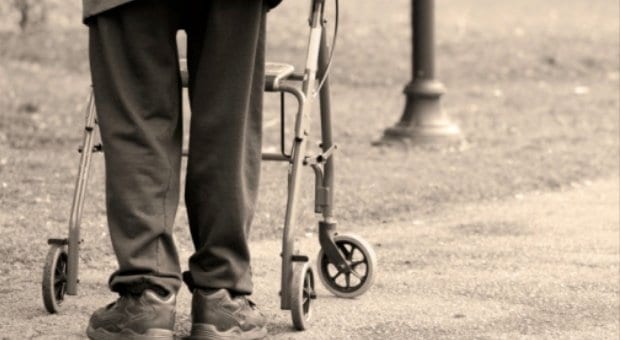The producers of Gay and Grey, a special series on aging and gay seniors by CBC Radio One’s On the Coast, hosted a public forum at Vancouver’s Fountainhead Pub on March 12, with expert panellists and a friendly, varied crowd who voiced their concerns. All in all a good thing.
Aging was already on my mind. Just days earlier gay playwright Sky Gilbert had written a Globe and Mail column about online university education. He had qualified himself as being “terribly old.” Tongue-in-cheek perhaps, but I was miffed because we happen to be the same age.
I recently spent some time with a 90-year-old neighbour — a man 30 years older than Sky and me. Not my sort of guy: the sort known to use words like squaw, paki, frog (read: First Nations woman, South Asian person, Québécois). Yet it has never occurred to me to label this vital man — who lives on his own, who tears up the country roads in his brand new car — as “terribly old.”
Redneck yes, I’ll label him that.
Why did I visit? He is isolated on a country road, dealing with terrible winter weather and the loss of his wife from Alzheimer’s. A lot of challenges for an aging guy. But I made him laugh, showed him a photo of the raccoons nesting in his ancient outhouse out back.
Terribly old. Once upon a time I might have been tempted to use a similar label to describe senior gay men. As an 18-year-old roaming downtown Toronto in the early 1970s, my introduction to “gay and grey” was being warned to stay clear of the St Charles Tavern: “where the chicken hawks lurk.” Otherwise the concept of gay seniors did not exist.
Meanwhile, in Montreal, a future friend was calling anyone over 30 a “coffin.” I may have been less creative with my language, but I did share his sentiments. Until I turned 30, of course.
By then, the 1980s were well underway. Living in Montreal, I met a variety of senior gay men through my job: some quite into the booze, products of the bar scene, not too distant from Boys in the Band. Others were quiet and serious but living mostly hidden lives.
In 1990s Vancouver, I met older gay men and women who were working as volunteers. The subject of age would never come up. They were there to help: the ’80s and ’90s had been really rough for gay men. And the focus was on young men; gay seniors were rarely mentioned.
But I do remember a 30ish acquaintance who liked to call a local 65-year-old gay man the “tired old thing.” Although in great physical shape — the man swam daily lengths at the aquatic centre — he earned the negative moniker because he was celibate, closeted and relentlessly bitter. Had he called himself “terribly old” when he was 60?
Was he, at 65, “incredibly” or “devastatingly” old?
As it turned out, the “tired old thing” would need no further labels because he soon dropped dead.
Montreal, the fall of 2008. Imagine an 88-year-old gay man sitting up straight at a table, hard at work. A crowd of all ages at the Galerie Dentaire, but Peter Flinsch the artist was busy sketching: nothing hidden about his life, the gallery full of his erotic paintings. Not “terribly old” at all.
Ten weeks earlier, at another Montreal event, I sat in front of an almost unrecognizable 83-year-old film star, Tony Curtis — who some say batted for both teams — and heard him speak eloquently. Yet I also heard the whispers: “He’s terribly old.”
What “terribly old” means to me: no expectations.
We will face a lot of the same challenges as the 90-year-old redneck: isolation, lack of mobility, loss of partners. But what else will gay seniors face? Will we hide? What will we give up? What will our community do to help?
On the minds of many at the Gay and Grey public forum: new expectations.

 Why you can trust Xtra
Why you can trust Xtra


